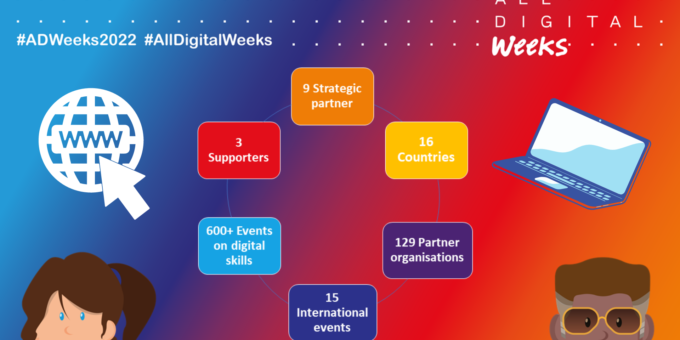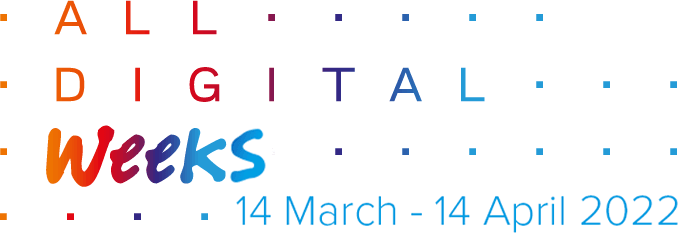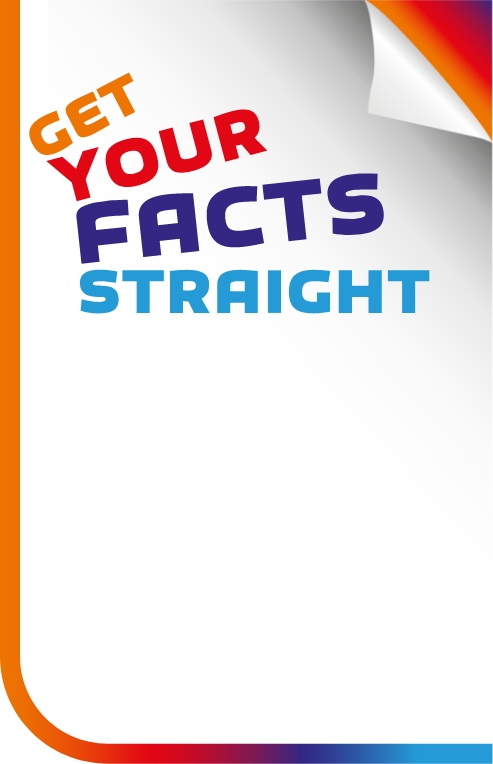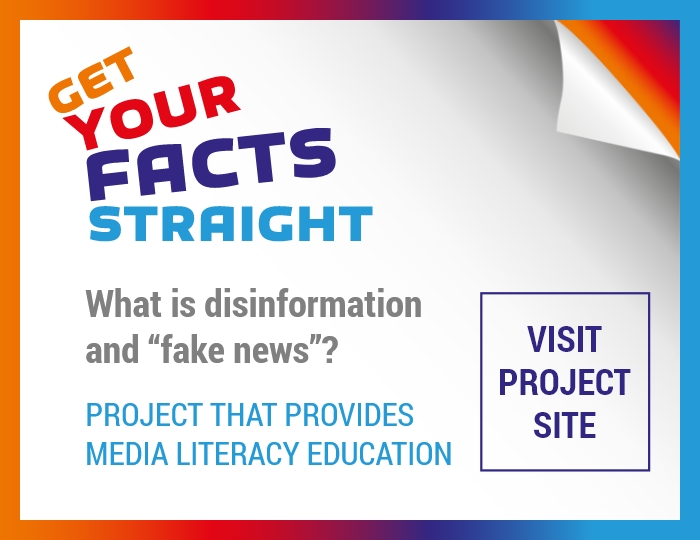
ALL DIGITAL WEEKS 2022 REPORT
Read the AD Weeks 2022 report
Intro
The ALL DIGITAL Weeks is an annual digital inclusion and empowerment campaign run at digital competence centres, libraries, community centres, schools and other venues across Europe. Every year it helps 100,000 Europeans to learn and be inspired by what technology can do for them.
In 2022 the campaign took place for the 13th year and its motto is a call to action for all Europeans to take an active part for a better future: ‘’Enhance your digital skills’’ as the DESI report showed a clear digital skills gap among European citizens, both in basic and advanced skills.
The objective of this awareness raising campaign is to maximise the impact and visibility of members, partner and participant organisations’ events and activities focused on enhancing digital skills, education, and competences for the digital transformation. The ALL DIGITAL Weeks awareness campaign aims to show the needs of empowering all European citizens with the digital tools and skills they need in their studies, job and for social inclusion.
The campaign supported the implementation of specific actions of the Digital Education Action Plan 2021-27 of the European Commission, with the main objective of enhancing digital skills and competences for the digital transformation. ALL DIGITAL Weeks 2022 also contributed to the promotion of the European Year of Youth promoted by the European Commission, through the organisation of specific events and training supporting young people in the digital transformation.
The campaign took place over 5 weeks (14 March-14 April 2022) both at European/International level and at local/regional level. On the broader dimension 15 international events were organised involving policymakers, the European Commission. At grassroot level the campaign reached more than 60.000 participants thanks to the contribution of 133 local partners who organised more than 600 events, in about 200 cities, spreading over 24 countries.
The 5 different weeks of the campaign focused on the following specific weekly core themes under which all the training and events were organised at international and national level across Europe:
- Enhancing digital skills and promoting digital inclusion and accessibility
- Fostering digital literacy and tackling disinformation
- Promoting the use of the European Digital Competence Framework (DigComp)
- Achieving cybersecurity and safer internet
- Improving STEM and STE(A)M skills for society and encouraging girls’ and women’s participation in STEM studies and careers
Partners
ALL DIGITAL Week 2022 was organised in partnership with 3 industry supporters: Huawei, Microsoft and Certiport, and with the contribution of the European Commission (DG EAC, DG EMPL and JRC).


The campaign has received the support and contribution from 9 strategic partners: EVBB, Obessu, Diesis Network, EPA, European Digital SME Alliance, Lifelong Learning Platform, Europeana, EFIL.

The ALL DIGITAL Weeks campaign was implemented with the involvement of 18 member organisations, who organised activities at local, regional, and national levels and put events on the map: Cyprus Computer Society, AUPEX, Fondazione Mondo Digitale, Diesis Network, Langas į ateitį, Helliwood media & education, Simbioza Genesis, Fundación Esplai Ciudadanía Comprometida, Le Mans University, EGInA Srl, CyL Digital, Centre of technical culture Rijeka, Acción contra el Hambre- European Network of Innovation for Inclusion, Open Group, TIEKE, Dedalo Foundation for the Development of the Information Society, Media Education Centre, LIKTA.
International Events
ALL DIGITAL organised 13 international events and hosted Diesis Network and EPA (European Parents’ Association) events in the framework of the campaign.
Week 1 – Launch Event
The campaign was launched during an online event on the 14th of March, which was rich of insightful speeches delivered by many of our supporters and representatives from European Institutions, policymakers, IT industry and digital education representatives.
European Commission Position
 European Commissioner for Innovation, Research, Culture, Education and Youth, Mariya Gabriel opened the campaign delivering her keynote speech: “Reflections and policy updates on the DEAP and why the focus on education will strengthen Europe”.
European Commissioner for Innovation, Research, Culture, Education and Youth, Mariya Gabriel opened the campaign delivering her keynote speech: “Reflections and policy updates on the DEAP and why the focus on education will strengthen Europe”.
In her speech she focused on some of the 5 key themes of the campaign: ‘’There is a clear reason why digital skills are so prominent in the Digital Education Action Plan (DEAP). One of the most important areas in which we must work (…) are digital skills and media literacy. Because digital skills are not limited to learning about tools and technologies. Digital skills require the critical thinking skills to exercise judgment, analyse complex realities, and ultimately recognize the difference between fiction, opinion, and fact’’.
She added ‘’we need women to be able to act upon the digital space and to tackle the gender divide (…)’’. Lastly, she reminded ‘’we have the digital education hub, where we want the community of stakeholders including you (ALL DIGITAL), of course, to tackle the challenges we face and make the most of the resources we have’’. She concluded with a call to action: “We are at a turning point for the development of digital skills. We need the support of all education and training stakeholders. I count on you to carry on bringing this vision forwards”.
Michael Horgan, Policy Officer, EC DG EMPL highlighted how ‘’Digital skills really are at the top of the EU political agenda and mentioned some important developments regarding European tools and actions to help with digital upskilling: the Update of DigComp, the European Digital Skills Certification (EDSC), Micro-credentials and Individual Learning Accounts (ILAS), and the recently launched Structured Dialogue on Digital Education and Skills.
Industry representatives
 Tony Jin, Huawei’s Chief Representative to the European Institutions, highlighted how Huawei will contribute to society: ‘’We will help enhance people’s digital skills by combining the strengths of the European traditional industries with vocational training. We can significantly improve the skills of digital talent across the whole Europe.’’
Tony Jin, Huawei’s Chief Representative to the European Institutions, highlighted how Huawei will contribute to society: ‘’We will help enhance people’s digital skills by combining the strengths of the European traditional industries with vocational training. We can significantly improve the skills of digital talent across the whole Europe.’’
 Jeremy Rollison, Senior Director of European Government Affairs for Microsoft also spoke about the relevance of digital skills and the jobs of the future: ‘’We want to make sure that we’re continuing to provide access to the tools and reskilling or upskilling opportunities that are going to be needed to leverage the jobs of the future and support those jobs. Now, for example, we expect close to 150 million tech jobs to emerge by 2025 in areas like software, cybersecurity, AI, and machine learning’’.
Jeremy Rollison, Senior Director of European Government Affairs for Microsoft also spoke about the relevance of digital skills and the jobs of the future: ‘’We want to make sure that we’re continuing to provide access to the tools and reskilling or upskilling opportunities that are going to be needed to leverage the jobs of the future and support those jobs. Now, for example, we expect close to 150 million tech jobs to emerge by 2025 in areas like software, cybersecurity, AI, and machine learning’’.
Stakeholders and civil society
Giuseppina Tucci, LLLP, President and OBESSU, Secretary General expressed the civil society position on digital education: ‘’Civil society is not only the receiver of the digital technologies and digital education, but it is a co-shaper and co-definer of learning.’’
Sebastiano Toffaletti, European Digital SME Alliance, Secretary General stated that ‘’Civil society needs to be a core shaper of technology and it needs to do so, because technology also helps us practice democracy’’.
Altheo Valentini, ALL DIGITAL President: ‘’Our main concern is to contribute to shaping digital transformation with digital education, in a way that digital skills will be more and more understood and integrated in a transversal way to all the sectors of the society: from the professional development of the person at all possible level to the participation in the inner civic democratic environment.’’
Week 2 – Fostering digital literacy and tackling disinformation
In the event dedicated to the value of certification, Fiona Fanning, Certiport summarised her position with some wishful ideas: ‘’We would love to see a world where digital skills or the lack of them is not an obstacle any longer. We think the best way to do this is through individuals learning, validating the skills through certification’’.

Guillem Porres, Technician of the Esplai foundation stressed that ‘’the value of certification has always been the value of improving the employability of the people who participate in our programs’’.
Week 3 – DigComp Framework
The launch event of Week 3 has been the most successful event of the campaign as it dealt with a very interesting and timely topic: the presentation of the update of the DigComp Framework to its version 2.2. Ana Carrero, Deputy Head of Unit – Vocational Education and Training at DG Employment, emphasised the fact that everybody is aware that the digital transition will have a marked impact on the labour market and on skills: ‘’Over 90% of the jobs already require some level of digital skills, in the collaborative economy and dealing with robotization or AI services. It is imperative that all workers and learners are equipped with the necessary skills.’’
 Riina Vuorikari, Research Fellow and Lead for DigComp 2.2, JRC, European Commission, presented the DigComp 2.2 update as part of the DEAP and tried to answer to the question: what does it really mean to be digitally competent today? She then stressed that ‘Competence is composed of three different elements, skills, knowing how to do something, knowledge, also the background load, maybe more theoretical knowledge, and attitude, which is the open critical attitude towards new technologies.’’ As well she said ‘’The DigComp update gives 250 examples of knowledge, skills, and attitude, and this is to really help education and training providers to update their curriculum and course materials, so that they can face today’s challenges.’’
Riina Vuorikari, Research Fellow and Lead for DigComp 2.2, JRC, European Commission, presented the DigComp 2.2 update as part of the DEAP and tried to answer to the question: what does it really mean to be digitally competent today? She then stressed that ‘Competence is composed of three different elements, skills, knowing how to do something, knowledge, also the background load, maybe more theoretical knowledge, and attitude, which is the open critical attitude towards new technologies.’’ As well she said ‘’The DigComp update gives 250 examples of knowledge, skills, and attitude, and this is to really help education and training providers to update their curriculum and course materials, so that they can face today’s challenges.’’
Later in the Week 3, Digital Success Programme presented the Hungarian DigKomp System, an adaptation of the European DigComp framework in the Hungarian perspective, showcasing its development and the future plans to create two digital competence profiles. The first one, Citizen Basic, describes the necessary level of digital competence needed to prosper in everyday life for all citizens of Hungary. The second profile, Citizen Plus, shows the proficiency level of digital competence needed to prosper in the labour market and enter higher education. The system will act as a development tool for citizens to reach these levels in the near future.
Week 4 – Cybersecurity and Safer Internet
 On the day of the launch of Week 4 Peter Palvolgyi, ALL DIGITAL CEO, presented a very critical topic: “Cybersecurity and safer internet environments interest citizens, companies, governments, policymakers impacting their living and working. This topic is very wide, and it covers technical aspects like data sharing protection, digital identity, technologies that we often hear about.’’
On the day of the launch of Week 4 Peter Palvolgyi, ALL DIGITAL CEO, presented a very critical topic: “Cybersecurity and safer internet environments interest citizens, companies, governments, policymakers impacting their living and working. This topic is very wide, and it covers technical aspects like data sharing protection, digital identity, technologies that we often hear about.’’
Una O’Sullivan, Corporate Affairs Manager at Microsoft, provided a wide overview of the real risks and good practices when tackling cybercrimes. During the pandemic online risks increased enormously, but a shared solution came out of Microsoft’s Digital Civility Index survey, as Una argued: “Most respondents (to the survey) agreed that education was critical in ensuring that the internet becomes a safer environment. A lot has to be done on the education side and through Microsoft’s Council for Digital Good, young people have been contributing, participating and sharing the voice of youth as well as all these organizations are working to improve the online experience, understanding how to make cybersecurity more compelling for young people”.
Week 5 – STEM/STE(A)M skills for society & women and girls in STEM
 During the Week 5 launch event Leonie Bultynck, Policy Assistant in DG EAC, European Commission, responsible for Action 13: enhancing women participation in STEM, described the so called ‘’leaky pipeline’’ phaenomenon where only one in three STEM graduates is female, only 22% of ICT graduates is female, which translates also into the job market where only 19% of tech sector jobs are held by females. She also said ‘’There are many barriers to women in STEM: the idea of a confidence gap, gender stereotypes, and the lack of role models.’’ And presented the policy initiatives to foster women participation in STEM.
During the Week 5 launch event Leonie Bultynck, Policy Assistant in DG EAC, European Commission, responsible for Action 13: enhancing women participation in STEM, described the so called ‘’leaky pipeline’’ phaenomenon where only one in three STEM graduates is female, only 22% of ICT graduates is female, which translates also into the job market where only 19% of tech sector jobs are held by females. She also said ‘’There are many barriers to women in STEM: the idea of a confidence gap, gender stereotypes, and the lack of role models.’’ And presented the policy initiatives to foster women participation in STEM.
The Closing event has involved stakeholders and members. The first part hosted the policy discussion where first Ciaran Conlon, Director for European Government Affairs at Microsoft, emphasised that challenges and issues in the digital world are similar, and connected, to those in the non-digital world. He named three broad areas as key factors for the future of digital: personal safety, the security and robustness of institutions and systems, and equality of opportunity, participation, and inclusion. After, Martina di Ridolfi, Program Officer for Digitalisation at ETUCE, focused on the role of teachers and educators as a stakeholder group for implementation of digital competences and highlighted the need to raise awareness among teachers and students of their rights and the risks in digital spaces, as well as the need for further collaboration among stakeholders.
 During the second part, Nenja Wolbers, ALL DIGITAL Deputy Chair of the Board and Stiftung Digital Chancen Project Manager, moderated the session where ALL DIGITAL presented their experiences, best practices, and the results at national/regional level. Five member organisations from different European countries and regions took part in this session: AUPEX from Spain, LIKTA from Latvia, Simbioza from Slovenia, Langas į ateitį from Lithuania and Global Libraries from Bulgaria. The members focused on the online services offered to the citizenship, such as workshops for an older age target, their projects on digital literacy/inclusion, critical thinking, the increasing importance of cybersecurity and digital development.
During the second part, Nenja Wolbers, ALL DIGITAL Deputy Chair of the Board and Stiftung Digital Chancen Project Manager, moderated the session where ALL DIGITAL presented their experiences, best practices, and the results at national/regional level. Five member organisations from different European countries and regions took part in this session: AUPEX from Spain, LIKTA from Latvia, Simbioza from Slovenia, Langas į ateitį from Lithuania and Global Libraries from Bulgaria. The members focused on the online services offered to the citizenship, such as workshops for an older age target, their projects on digital literacy/inclusion, critical thinking, the increasing importance of cybersecurity and digital development.
The goal of the campaign which was to increase the awareness on digital skills thanks to the organisation of webinars, meetings, trainings and conferences on the topic to educate the European citizens and enable them with the adequate skills to face the digital transformation with confidence.
Projects presentations
During the ALL DIGITAL Weeks 2022 campaign 7 events focused on the presentation of 8 projects were ALL DIGITAL is a partner: AMeLiE, ACTIon, CrAL, Bibilio, Transval-EU, RAYUELA, EQUALS-EU, STE(A)M on Edu.
The speakers at the ACTIon project webinar analysed one of the main issues with regard to young online participation awareness and information. Even though young people may be keen to participate online they may not be able to identify the right and trustful tools, information and news sources.
During the joint event dedicated to media literacy two projects were presented. The AMeLiE project event defined an innovative methodology and approach to counter the phenomenon of online hate speech. Training teachers and representatives of school shared their experience in relation to the implementation of the methodology. Then it was highlighted the main product of the CrAL project: the innovative educational methodology on how to set up creative audio-visual apps in schools. Trainers and educators from Croatia, Greece, Italy, Lithuania and Spain took part in this project.
The Biblio project webinar expressed the challenge tackled by the project: “to provide the future digital librarians and digital curators with the competencies and the skills and knowledge to address the challenges of the digital transformation”.
The event “Digital skills as transversal skills” focused on the TRANSVAL-EU project to see what transversal skills can be applicable in different work and life contexts, and how to identify and validate them. The NADINE platform for migrants, refugees and young people was presented as a good tool.
RAYUELA project was presented during the cybersecurity and safer internet week 4 launch event. The first part of the project aims at identifying the main drivers behind cybercrimes, especially those that affect younger generations. The collected data are then used to kick off the next part of the project focused on the development and pilot testing of a video game based on stories where young people can have a safe environment to reflect, understand, recognize, and see how specific types of cybercrimes can affect them.
EQUALS-EU webinar was dedicated to the introduction of the project, its goal to reinforce gender equality in the Digital Age and the established partnerships and activities. It has been clearly expressed the need for concrete supportive strategies and acts on national, regional and organizational level to increase the number of mentors, role-models and ombudsman who can act as role model in order to support the inclusion of women and girls.
The campaign also covered STE(A)M on Edu project, completed last year, giving space to the overview on the policy recommendations on the topic. The webinar aimed at exploring STE(A)M education policies and move them forward at European, national and local level targeting educators, learning centres, educator managers and policymakers at any level of formal, non-formal and vocational education.
Results 2022 Campaign Central events of ALL DIGITAL during All Digital Weeks 2022
 During the campaign ALL DIGITAL has directly organised 13 events attended by 639 participants and the video recordings of the event received about 1000 views. The most successful events have been the DigComp 2.2 launch event (139 participants), the campaign launch event (95 participants), and the Biblio webinar (63 participants)
During the campaign ALL DIGITAL has directly organised 13 events attended by 639 participants and the video recordings of the event received about 1000 views. The most successful events have been the DigComp 2.2 launch event (139 participants), the campaign launch event (95 participants), and the Biblio webinar (63 participants)
Results from the map of events
- 626 events organised by 133 members, partners and local organisations, reaching out 24.000 participants, have been uploaded to campaign map.
- Activities were organised in 24 countries: Albania, Belgium, Bulgaria, Croatia, Cyprus, Finland, France, Germany, Greece, Hungary, Ireland, Italy, Latvia, Lithuania, Netherlands, Portugal, Romania, Serbia, Slovenia, Spain, Sweden, Tunisia, Turkey, Ukraine.
- The countries with most participants involved in the campaign have been Latvia (35000+), Lithuania (3993), Romania (2586), Spain (2512), Sweden (2453), Italy (1810) and Cyprus (1645).
- Additional 35000+ participants from Latvia who use their own electronic map.
- The events were organised on the 5 key themes of the campaign. The most covered theme has been ‘’enhancing digital skills/digital inclusion/accessibility’’ (58,05% of events) followed by digital literacy/tackling disinformation (19,94%).

- The audience groups most targeted by the events have been the general public (32,29%), school students (27,15%) and unemployed adults (17,32%).

Participants per country
| Country | Number of participants |
| Albania | 130 |
| Bulgaria | 408 |
| Cyprus | 1645 |
| France | 1200 |
| Greece | 1116 |
| Ireland | 80 |
| Latvia | 2044 (+35000 not on the map) |
| Netherlands | 50 |
| Romania | 2586 |
| Slovenia | 710 |
| Sweden | 2453 |
| Turkey | 1232 |
| Belgium | 420 |
| Croatia | 1397 |
| Finland | 100 |
| Germany | 115 |
| Hungary | 65 |
| Italy | 1810 |
| Lithuania | 3993 |
| Portugal | 14 |
| Serbia | 100 |
| Spain | 2512 |
| Tunisia | 30 |
| Ukraine | 160 |
| Total | 24370 |
Participants to the events
| ALL DIGITAL Weeks 2022 Events | ||||
| Name | Date | Number of Registered Participants | Number of Actual Participants | Youtube views* |
| Launch Event: Enhance your digital skills | 14/03/2022 | 117 | 95 | 154 |
| Fostering Digital Skills & The Value of Certification | 21/03/2022 | 87 | 60 | 82 |
| How to… support young people to use digital | 23/03/2022 | 49 | 32 | 50 |
| Innovative approaches to enhancing Media Literacy | 24/03/2022 | 46 | 35 | 32 |
| Week 3 Launch event Digital Competence Frame | 28/03/2022 | 175 | 139 | 242 |
| BIBLIO | 29/03/2022 | 115 | 63 | 39 |
| Digital skills as transversal skills | 30/03/2022 | 68 | 45 | 26 |
| DigKomp Hungary | 30/03/2022 | 42 | 35 | 189 |
| Cybersecurity and safer internet | 04/04/2022 | 46 | 38 | 61 |
| improving STEM and STE(A)M | 11/04/2022 | 33 | 21 | 23 |
| Gender equality a reality | 12/04/2022 | 24 | 18 | 23 |
| Policy Recommendations to STE(A)M-on Education | 13/04/2022 | 24 | 22 | 21 |
| Closing Event | 14/04/2022 | 39 | 36 | 55 |
| Total | 639 | 997 | ||


























